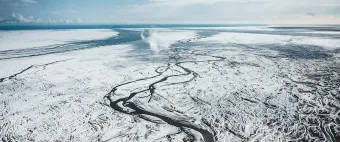Diplomatic Deadlock in the Arctic: Science as an entry point to renewed dialogue

Diplomatic Deadlock in the Arctic: Science as an entry point to renewed dialogue
The ongoing geopolitical confrontation over Russia’s war in Ukraine led to the severing of constructive diplomatic communication on many issues of multilateral relevance. The Arctic, long considered a model of international collaboration, has not avoided the consequences; on a number of pressing topics, including security, science, and the environment, there is little cooperation remaining between the West and Russia. The lack of an adequate forum for addressing the urgent threats facing the Arctic led the Switzerland-based Geneva Centre for Security Policy (GCSP) to launch a discreet dialogue process (the ‘High North Talks’) to address some of these gaps. These talks convene experts from the states most invested in the Arctic, with a view to developing creative solutions and conveying them to decision-makers for consideration. One area of attention is scientific collaboration, which has largely ceased since the full-scale invasion of Ukraine in February 2022. Regardless of the geopolitical fallout from the war, it is imperative that an accommodation be found to jointly address the most pressing of the Arctic’s challenges, which are long-term and global in nature, and in some cases irreversible if they are left unattended.
Paul Dziatkowiec was appointed Director of Mediation and Peace Support in 2021. Prior to that, for nearly a decade he served as Project Manager in various roles at the Centre for Humanitarian Dialogue (HD), an organisation that mediates between protagonists in armed conflicts.
Disclaimer: This publication was originally published on the Arctic Portal website. The views, information and opinions expressed in this publication are the author’s/authors’ own and do not necessarily reflect those of the GCSP or the members of its Foundation Council. The GCSP is not responsible for the accuracy of the information.
